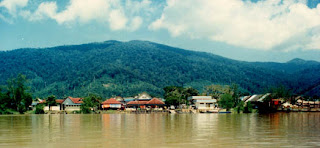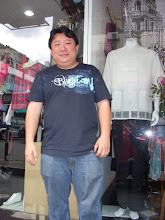










Within Lundu Town.
The Malay word for "town" is
pasar. This derives from the Persian
bâzâr, and means "market." People say, "I'm going down to the pasar," in Malay, Iban, Selako, and English (or, alternatively, in English, "I'm going down to the bazaar") as often as they say, "I'm heading for town." The market is the town, the town is the market. Few people actually live
in the pasar except for the (usually Chinese) owners of retail businesses and coffeshops, and their families. Everybody else lives outside the pasar, in one kampong or another, or in a house on a separate plot.
An open shop at the Dry Market. As the name suggests, the Dry Market is where things like salt fish, beans, rice, coffee, and sundries are sold.
Directly facing the dry market is the bus-station. The Kuching busses arrive and depart from here. And there is service to Bau in the east, to Sematan and Pueh in the west, and also to Kampong Pandan. By this last route one may get to Gunung Gading National Park---about one mile outside of town---and to Siar and Pandan beaches, which are considerably further out.
At the center of Lundu town lies the
padang or square. Shophouses line three sides of the padang, and the third side is open to the river. Here we are looking NW from the river side.
From the back area of my office, one has a complete view of Lundu's Wet Market. Here are sold vegetables, fruits, and other things. Upstairs in the main building is a "food court."
Traders in the main building specialize in vegetables grown by commercial farmers outside Kuching, and in imported fruits such as apples. Many of the traders here also grow and sell their own vegetables and fruits, such as cucumbers and citrus.
To the left of the main building stands a large oven pavilion. Here Dayak women bring the vegetables they grow to sell. They will also sell the jungle produce they collect: ferns (
midin and
paku), bamboo and palm shoots, and wild fruits. Women traditionally take care of this type of business.
The old District Office, built by the British during Sarawak's brief time as a colony.























No comments:
Post a Comment